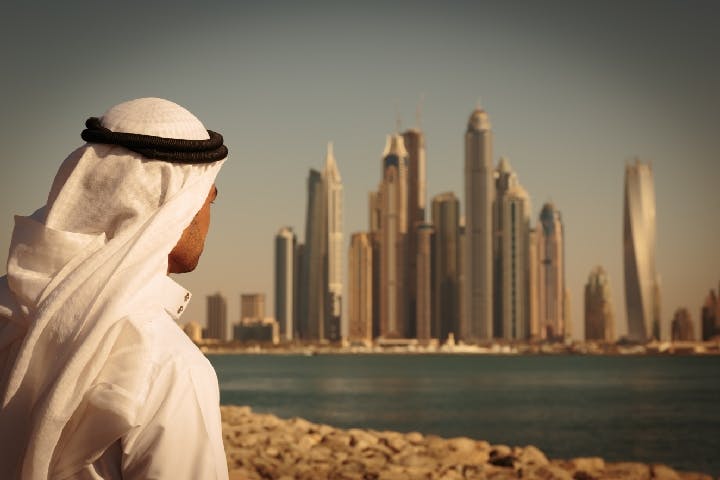For the Emirates, an à la carte Enlightenment?
– Carlo Massimo
The United Arab Emirates’ hereditary elites are trying to engineer an Enlightenment. Why?
Something strange is happening in the United Arab Emirates. The hereditary elites of the UAE — a country where the citizens neither vote nor pay tax, where premarital sex is punishable by flogging, and where South Asian laborers toil in appalling conditions — want a liberal populace, a citizenry steeped in the individualism, critical thinking, and entrepreneurial spirit of the West. A feat of social engineering is underway in the Emirates, and on an enormous scale: new school curricula, fantastic public spectacles, and state-funded festivals herald the arrival of a smiling new Enlightenment along the Persian Gulf.
Calvert Jones of the City University of New York spent 15 months in the palaces of the UAE’s elites, not only to observe this social engineering up close, but to unwrap the paradox of liberal social reform in a country proverbial for its repressive autocracy.
There’s quite a bit to unwrap. This is a comprehensive campaign, aimed largely at Emirati youth: in schools, old-school rote memorization and Islamic studies are out, and English, science, and civics, often taught by Western instructors, are in (as is No Child Left Behind-style standardized testing). New York University has opened a campus in Abu Dhabi, UAE’s capital city. A branch of the Louvre is under construction in Abu Dhabi, as is a new outpost of the Guggenheim, the latter slated to be designed by Frank Gehry. The government hosts a biannual “Festival of Thinkers,” a lavish, TED Talk-esque convention with speakers and workshops and monumentally high-flown rhetoric. The son of Dubai’s ruling sheikh encourages schoolchildren to “discover themselves” while competing in a contest for young entrepreneurs, a contest he personally funds.
The UAE is not the first autocratic country to attempt to foster liberal values among its own people. In the past 15 years, Saudi Arabia, Singapore, Kazakhstan, and China have all initiated similar projects. The idea has precedent: after all, the European Enlightenment came into being under the aegis of so-called “enlightened despots,” including Frederick the Great, Catherine the Great, and Maria-Theresa of Austria. With great energy and at great expense, these monarchs sponsored and otherwise encouraged philosophers, artists, and scholars. And all of them held absolute, unmitigated sway over their subjects, enforcing their power, when necessary, with brutality.
Some reasons for the UAE’s liberal turn, as Jones writes, suggest themselves. It all sounds like a ploy to our cynical ears: the people of the UAE get fed an attractive story about individualism and empowerment, and in their bliss forget how few rights the government affords them, how little say they have in politics, and how little of the country’s vast oil revenues trickles into their pockets. Or else it’s a lie directed at the West: see, we have the same values as you. Our schools look like your schools, our children speak English, we reward our people for their innovation and their pluck. This is not Egypt or Syria. We are not the Muslim Brotherhood. Only please don’t look behind the curtain.
Undeniably, there’s some truth to both hypotheses (especially the second). Qatar, the host of the 2022 FIFA World Cup, has already been blasted in the Western press for its human rights abuses; and with so many of its regional neighbors in flames — Yemen, Syria, Egypt, Iraq — the Emirates have an urgent need to present themselves to the West as stable, reasonable, and friendly. But Jones, in her interviews with Emirate royalty and in conversation with UAE officials, found a much stranger, but equally urgent motive.
Many of the UAE elites currently pushing for liberal reform studied abroad in the West. When they returned from university, the atmosphere at home disappointed them profoundly. Forty years of successful rentier government — by which the mere renting out of oilfields provides enough money to not only bankroll the state, but to make it fantastically wealthy — has spawned a kind of malaise among the Emiratis. The generations that grew up with phenomenal, untaxed wealth have none of the drive, none of the rigor of their Western peers, at least not in the eyes of those elites who have lived abroad. Jones calls it a “sense of entitlement and listlessness among UAE youth,” and it seems to be the natural result of a lifestyle where no one works hard to get anything, whether food, money, or grades. These young people, who have never managed a household budget or written a report, are the future of the UAE, the future investors, the future soldiers, the future heads of state. And when the rich petroleum deposits finally run dry and the rentier state can no longer function, it will be up these youths to reconfigure — drastically reconfigure — the fabric of Emirate society.
The Enlightenment on the Gulf, then, is little more than medicine for an anemic generation. It is a bizarrely apolitical brand of liberalism, and it is unclear whether the new values of critical thinking and interaction with the West, once firmly established, will threaten or bolster the autocracy of the Emirates. That critical moment has yet to arrive. For now, and possibly for as long as the oil flows, the liberalization of the UAE will take the form of sumptuous architecture, elaborate speeches, spectacular events, and very little else.
* * *
The Source: Calvert Jones, “Seeing Like an Autocrat: Liberal Social Engineering in an Illiberal State,” Perspectives on Politics 13.1 (2015): 24-31.
Photo courtesy of Shutterstock/Laborant
Updated: An earlier version of this piece misstated the year Qatar is slated to host the FIFA World Cup. They’re hosting the 2022 tournament, not 2016, as originally stated.
